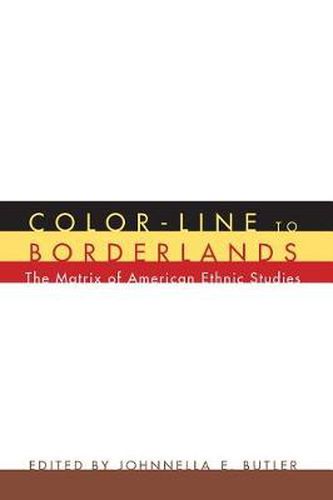Readings Newsletter
Become a Readings Member to make your shopping experience even easier.
Sign in or sign up for free!
You’re not far away from qualifying for FREE standard shipping within Australia
You’ve qualified for FREE standard shipping within Australia
The cart is loading…






This title is printed to order. This book may have been self-published. If so, we cannot guarantee the quality of the content. In the main most books will have gone through the editing process however some may not. We therefore suggest that you be aware of this before ordering this book. If in doubt check either the author or publisher’s details as we are unable to accept any returns unless they are faulty. Please contact us if you have any questions.
Ethnic Studies … has drawn higher education, usually kicking and screaming, into the borderlands of scholarship, pedagogy, faculty collegiality, and institutional development, Johnnella E. Butler writes in her Introduction to this collection of lively and insightful essays. Some of the most prominent scholars in Ethnic Studies today explore varying approaches, multiple methodologies, and contrasting perspectives within the field. Essays trace the historical development of Ethnic Studies, its place in American universities and the curriculum, and new directions in contemporary scholarship. The legitimation of the field, the need for institutional support, and the changing relations between academic scholarship and community activism are also discussed.
The institutional structure of Ethnic Studies continues to be affected by national, regional, and local attitudes and events, and Ronald Takaki’s essay explores the contested terrains of these culture wars. Manning Marable delves into theoretical aspects of writing about race and ethnicity, while John C. Walter surveys the influence of African American history on U.S. history textbooks. Elizabeth Cook-Lynn and Craig Howe explain why American Indian Studies does not fit into the Ethnic Studies model, and Lauro H. Flores traces the historical development of Chicano/a Studies, forged from the student and community activism of the late 1960s.
Ethnic Studies is simultaneously discipline-based and interdisciplinary, self-containing and overlapping. This volume captures that dichotomy as contributors raise questions that traditional disciplines ignore. Essays include Lane Ryo Hirabayashi and Marilyn Caballero Alquizola on the gulf between postmodernism and political and institutional realities; Rhett S. Jones on the evolution of Africana Studies; and Judith Newton on the trajectories of Ethnic Studies and Women’s Studies and their relations with marginalized communities. Shirley Hune and Evelyn Hu-DeHart each make a case for the separation of Asian American Studies from Asian Studies, while Edna Acosta-Belen argues for a hemispheric approach to Latin American and U.S. Latino/a Studies. T. V. Reed rounds out the volume by offering through cultural studies bridges to the twenty-first century.
$9.00 standard shipping within Australia
FREE standard shipping within Australia for orders over $100.00
Express & International shipping calculated at checkout
This title is printed to order. This book may have been self-published. If so, we cannot guarantee the quality of the content. In the main most books will have gone through the editing process however some may not. We therefore suggest that you be aware of this before ordering this book. If in doubt check either the author or publisher’s details as we are unable to accept any returns unless they are faulty. Please contact us if you have any questions.
Ethnic Studies … has drawn higher education, usually kicking and screaming, into the borderlands of scholarship, pedagogy, faculty collegiality, and institutional development, Johnnella E. Butler writes in her Introduction to this collection of lively and insightful essays. Some of the most prominent scholars in Ethnic Studies today explore varying approaches, multiple methodologies, and contrasting perspectives within the field. Essays trace the historical development of Ethnic Studies, its place in American universities and the curriculum, and new directions in contemporary scholarship. The legitimation of the field, the need for institutional support, and the changing relations between academic scholarship and community activism are also discussed.
The institutional structure of Ethnic Studies continues to be affected by national, regional, and local attitudes and events, and Ronald Takaki’s essay explores the contested terrains of these culture wars. Manning Marable delves into theoretical aspects of writing about race and ethnicity, while John C. Walter surveys the influence of African American history on U.S. history textbooks. Elizabeth Cook-Lynn and Craig Howe explain why American Indian Studies does not fit into the Ethnic Studies model, and Lauro H. Flores traces the historical development of Chicano/a Studies, forged from the student and community activism of the late 1960s.
Ethnic Studies is simultaneously discipline-based and interdisciplinary, self-containing and overlapping. This volume captures that dichotomy as contributors raise questions that traditional disciplines ignore. Essays include Lane Ryo Hirabayashi and Marilyn Caballero Alquizola on the gulf between postmodernism and political and institutional realities; Rhett S. Jones on the evolution of Africana Studies; and Judith Newton on the trajectories of Ethnic Studies and Women’s Studies and their relations with marginalized communities. Shirley Hune and Evelyn Hu-DeHart each make a case for the separation of Asian American Studies from Asian Studies, while Edna Acosta-Belen argues for a hemispheric approach to Latin American and U.S. Latino/a Studies. T. V. Reed rounds out the volume by offering through cultural studies bridges to the twenty-first century.